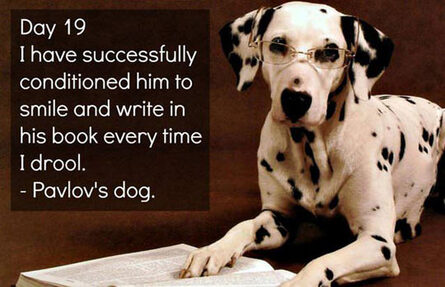|
It’s hard to think outside our own thinking to do the as-yet unthinkable, yet that’s often where real transformation takes place. How do you do it? How do you enable others to do it? What does a kilogram weigh on the moon? Is grass still green when it’s dark? I had this fascinating conversation with a chemistry student last night about what can be known to be true and how. We touched on philosophy, theology and science and I left feeling like my brain had been bent and twisted in different directions. One of the key principles that came through is that we base our understanding of the world on what we believe or know to be true already. It’s a form of projection that creates a psychological sense of certainty and enables us to predict, test and move on. It’s also a phenomenon that can leave us profoundly mistaken – without realising it. I listened to a radio interview with the controversial film director Quentin Tarantino. When asked to comment on the quirky, sudden and often dramatic mood swings in his films, Tarantino responded, ‘Who do you imagine I am directing in my movies – the actors or the audience?’ He went on to paint an image of himself standing invisibly behind the cinema screen like the conductor of an orchestra. The audience watches the film. He conducts the audience. The audience is the orchestra. It was a stunning example of challenging the assumed, reframing an experience, revealing the unexpected. The moral of this story? Not everything is as it appears to be or what we may want or expect it to be. We are easily unaware or deceived. It’s why ‘critical reflective practice’ is so valuable and important as professionals, leaders, managers, teams and organisations. It’s about taking conscious, proactive steps to challenge, test and transform our awareness, assumptions, thinking, stance and practice – enabling greater inspiration, resourcefulness, resilience and effectiveness. (See: Thompson & Thompson, The Critically Reflective Practitioner, 2008; Bassot, The Reflective Practice Guide, 2016). As leader, OD, coach or trainer, what have been your experiences of critical reflective practice? Where have you seen or experienced real transformation, radical re-framings or paradigm shifts? Can I help you develop critical reflective practice? Get in touch! [email protected]
50 Comments
‘How to develop a thick skin at work without being obnoxious.’ (Experteer) The article title made me smile. We often think of people with thick skin as tough, resilient and, at times, insensitive to others. It’s as if thick-skinned people are able to handle high levels of relational tension or conflict without feeling hurt or bruised. A similar personal-relational metaphor we sometimes hear is Teflon. If you are unfamiliar with it, Teflon is a material with ‘an extremely low coefficient of friction’ (Urban Dictionary). If something is coated with Teflon, stuff doesn’t stick to it. Tensions and conflict simply slide off, leaving a Teflon person unaffected by relational stress. Whilst thick-skinned or Teflon people may be insensitive to criticism or insults, other people may be overly-sensitive, feeling hurt by relational tension or allowing conflict to penetrate into their soul. A pastoral friend, Nikki Eastwood, uses a blotting paper metaphor to characterise this. If you are unfamiliar with it, blotting paper is an absorbent material, used to soak up excess ink when writing with a traditional ink pen. If we allow ourselves to absorb all the hurt, pain, frustrations etc. of other people, including that projected onto us, we can become debilitated, stressed and exhausted. I worked for most of my life in human rights work and international non-governmental organisations (NGOs). Faced, at times, with unspeakable suffering of others, I became very run down. Eventually, I spoke with an insightful therapist, Shona Adams, who challenged my risk of over-empathising. In my desire to feel and communicate genuine contact with others, I learned that sometimes I stepped so far into others’ shoes that I stepped out of my own. It was as if I was experiencing others’ traumas vicariously, yet without the resilience that people in such situations often develop or discover. So, what can we do to build healthy, constructive relationships that are neither too Teflon to the point of insensitive arrogance on the one hand or too over-empathetic to the point of unhealthy confluence on the other? How can we develop emotional intelligence and resilience? Firstly, listen actively for expressed and unexpressed feelings of others. If you’re unaware or unsure, be curious and inquire. Secondly, establish and maintain a clear psychological boundary and relationship between your experiences and those of others. It may be about you but it’s not only about you. If you would like help with creating and sustaining healthy, inspiring and effective relationships at work, get in touch! [email protected] 'The good news is you have 200 people working for you. The bad news is they don't see it that way.' (Euan Semple) I love how humour can transform, creating fresh perspective by shedding novel light on people, issues and situations in ways that plain comment or description just can’t. It can be a great technique for reframing, making the familiar unfamiliar and vice versa too. I worked with a colleague, Benjamin, who enjoyed using phases playfully. If something went wrong or didn’t work out as we had hoped, or if someone was sounding unduly pessimistic, he would simply grin disarmingly and say something like, ‘Ah well, every silver lining has a cloud.’ Humour can inject energy, diffuse tension, bring people together, make life and work more fun. Smiles and laughter are good for health and well-being too. I worked with Richard, an occupational psychologist and HR leader who had a passion for developing talent and enhancing people’s commitment, capacity and contribution. He could have presented his case for change using formal statistics, spreadsheets and information. Instead he would start with an open, provocative smile, ‘There are people who left this organisation years ago...but still turn up for work every day.’ It had a very different qualitative feel to sarcasm, cynicism or bland statement of fact. It was a powerful use of irony to highlight an issue, evoke curiosity, challenge the status quo and invite a response. I could almost hear every person in the room thinking, ‘I wonder if that could be me?’ For humour to work, it needs to have some resonance with what the audience already knows, perceives and experiences as real and true. I think back to the first time I read Scott Adams’ The Dilbert Principle (1996). I sat on my bed and literally cried laughing. It was for me, as for many others, a refreshingly new approach to shining a critical spotlight on the quirky, crazy and self-defeating politics of office life. This, however, signals that humour is culturally and contextually-relative. Have a glance, for instance, at satirical Despair.com. Are its posters funniest for those who have seen their earnest equivalents first? What have been your best experiences of humour at work? Who or what made them so effective? How can I help you create a more inspiring and effective workplace? Get in touch! [email protected] 'We're trapped in a Brexistential crisis.' (Ayesha Hazarika) Some confused friends in EU countries asked me today if I could explain what's happening on the Brexit front from a UK political perspective. It's not easy...but here's my best attempt: The Conservative Prime Minster wants to remain, but wants to appear to want to leave to satisfy the wants of her party that wants to leave, and the wants of the simple majority that wants to leave, whilst also wanting to satisfy the wants of people who want to remain. The Labour Leader of the Opposition wants to leave, but wants to appear to want to remain to satisfy the wants of the majority of his party members who want to remain, whilst also wanting to satisfy the wants of the majority of his party’s voters who want to leave. The majority of Members of Parliament want to remain, but want to appear to want to leave. They want to find ways to remain, to satisfy those people who want to remain, whilst also appearing to want to leave to satisfy the wants of the majority who want to leave. This short article addresses the question, how to spot and deal with untrue truisms that appear to be true. The tricky bit is that common truisms often guide and reinforce everyday beliefs, behaviour, decisions and actions – including at work. Untrue truisms can prove limiting, unhelpful or damaging. What do you think? ‘Ring a bell and Pavlov’s dog salivates.’ True? Not necessarily. It depends on the context in which the dog hears the bell (Anne Rooney, Psychology – How the World Works, 2019). ‘Brainstorming in a group generates more ideas than individuals generate alone.’ Not necessarily true either. It depends on whether individuals in the group have had opportunity to write down their own ideas separately first (Michael West, Developing Creativity in Organisations, 1997). We could list many more frequently-proclaimed and widely-accepted truisms here that turn out to be not entirely true. ‘People don’t like change’. Oh, really? Perhaps closer to the truth could be a more qualified statement, ‘Some people don’t like change’ or, as a variation, ‘Most people don’t like having change forced on them’ where the emphasis is definitely more on forced – an implied denial of choice, freedom, influence or control – than on change per se. The problem here lays in simplistic generalisations, superficial conclusions, trite clichés that may well sound plausible and convincing on the face of it yet lack validity and soundness. They present an idea of reality with an air of marked confidence, yet which doesn’t correspond with research evidence or lived experience. (Some contemporary politicians came to mind as I wrote that…but I won’t go there). Worse still, we and others may act on untrue-truisms as if they were true. What can we do as leaders, coaches, OD and trainers to notice, reveal and test hidden, personal-cultural assumptions that are so often masked and disguised as statements of fact? Firstly, listen for words or phrases that signpost a claim is about to follow, e.g. ‘of course, ‘obviously’, ‘clearly’, ‘self-evidently’, ‘everyone knows that’. Secondly, acknowledge that the explicit truth claim represents an implicit belief. Thirdly, open it up for critical exploration and evaluation. Can I help you develop critical reflective practice? Get in touch! [email protected] ‘Who started this work – the organisation’s founder, or the child who inspired him to do it?’ This challenge came as a healthy jolt, a moment of insight and inspiration, from Carlos, a humble, radical leader working with poor communities in Brazil. It was at an induction event for new leaders of a now very large, global non-governmental organisation (NGO). Its history was being presented through the lens of the organisation’s founder and its successive global presidents. The founder was a war photographer who had been appalled to see the terrible suffering of children during the Korean War. An encounter with a child had galvanised his determination to do something about it. The resultant NGO had worked very hard over the years to support poor and vulnerable children throughout the world and had indeed achieved some remarkable results. Over time, however, as the organisation had grown in scale and scope, it had started increasingly to view the world through an organisational lens rather than through the eyes of a child. The simple-yet-profound voice of a child had become lost in the midst of complex strategies, structures, policies, plans and programmes. The presidential perspective symbolised a shift from client/beneficiary-centric to organisation-centric. Why is this important? Firstly, this child’s interaction with and influence on the founder challenges traditional ideas of leadership as a hierarchical-structural phenomenon rather than, as according to Chris Rodgers (2015), ‘an emergent property of people interacting together, not as an elite practice confined to those at the top of organizations.’ Secondly, this NGO’s experience highlights the risk of subtle-yet-critical drifts away from a customer-client, outside-in focus to an intra-organisational, inside-out/inside-inside focus. How can we address these issues as leaders, coaches, OD and trainers? Can I help you develop authentic and client-focused leadership and culture? Get in touch! [email protected] 'In ‘Leadership and Self-Deception’ (2006), the Arbinger Institute highlighted the subtle, subconscious and serious art of deceiving ourselves and others in organisations...without realising it. This short article says a bit more about this strange risk phenomenon and invites your insights and ideas on how to address it! Is everything we know wrong?' In 2010, the BBC released a ground-breaking Horizon documentary entitled, ‘Is Everything We Know About the Universe Wrong?’ It set out to question and challenge current, fundamental and widely-held scientific beliefs about the universe, particularly in relation to ‘dark matter’, ‘dark energy’ and ‘dark flow’. Perhaps the most radical dimension to the investigation was its willingness to wonder. Are our hypotheses, our cosmological theories, so convincing to us, so self-evidently true for us, that they blind us, close down uncomfortable questions, act as powerful psychological-cultural filters? It coincided with the release of a plethora of popular books (e.g. Chabris & Simons’, The Invisible Gorilla, 2011; McRaney’s, You are Not so Smart, 2012) that set out to reveal and challenge our cognitive and cultural limitations and distortions. An underlying, recurring theme is that self- and group deception act in stealth mode. We are most deceived when we don’t know we’re deceived. We face the same challenges as leaders, coaches, OD or trainers: how to practise reflexivity/praxis ('critical reflective practice') whilst enabling other people, groups and organisations to do so too. Thomas Aquinas offers useful psychodynamic insight here. If we face an unresolved question that captures our interest and imagination, it sets us off on a quest, a journey, of discovery. If, however, we find an explanation or solution that we find convincing, the mind comes to a standstill, our thinking comes to a halt. This is a reason why transformational teachers such as Jesus, Buddha and Socrates are famous for posing high order, high quality, questions, puzzles or paradoxes – searching, evocative, provocative stimuli that leave us deeply restless until, if possible, we find resolution. So, some food for thought: As leader, coach, OD or trainer, what are you, or your clients, assuming or taking at face value? When have you, or they, leapt to a conclusion too soon, treating an open question as if it were a closed one? What rules, principles or received wisdom (e.g. ‘good practice’) do you, or they, consider obvious or sacred? When do you, or they, shut down questions or avenues of inquiry because they feel too difficult or sensitive to raise? Which tricky issues, experiences or conversations are you, or they, avoiding? How can you get self-deception out of stealth mode? Can I help you develop critical reflective practice? Get in touch! [email protected] |
Nick WrightI'm a psychological coach, trainer and OD consultant. Curious to discover how can I help you? Get in touch! Like what you read? Simply enter your email address below to receive regular blog updates!
|










 RSS Feed
RSS Feed